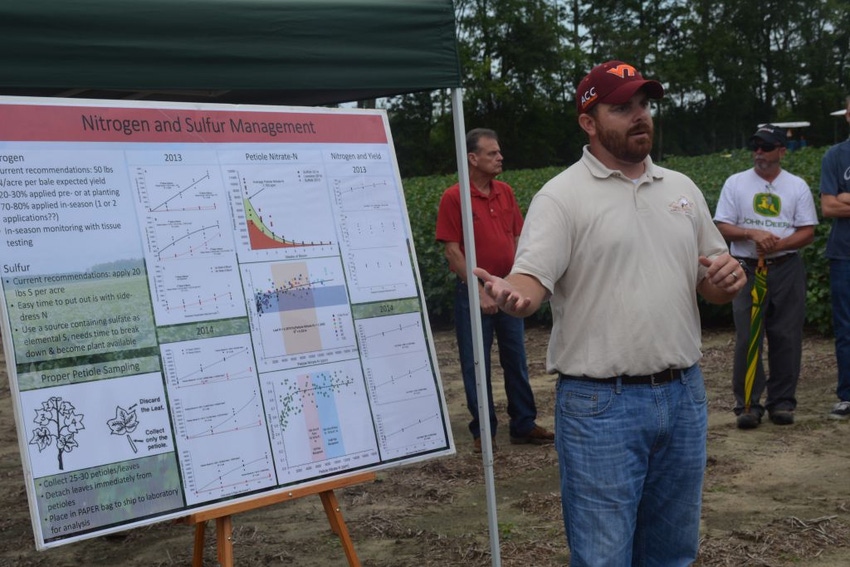
Virginia Tech has changed its nitrogen recommendations in cotton from a flat rate of 60 to 90 pounds per acre to more of a yield goal.
Speaking at the Virginia-Northeast North Carolina Cotton Field Day at Virginia Tech’s Tidewater Agricultural Research and Extension Center in Suffolk Aug. 11, Hunter Frame, Virginia Tech cotton specialist, said the Virginia recommendation is now 50 pounds of applied nitrogen per bale of expected yield.
“In Virginia we shoot for a two bale per acre yield goal,” Frame said. “I like to see 20 to 30 percent of the nitrogen go out at planting and then 70 to 80 percent applied in season, usually in one or two applications.”
Frame said cotton farmers need to focus on in-season monitoring for nitrogen management and tissue testing is important. For sulfur, Frame recommends 20 pounds per acre, half applied at planting and half applied with the in season nitrogen applications.
“An easy time to apply sulfur is with the side-dress of nitrogen. Use a source containing sulfate as it needs time to break down and become plant available,” Frame said.
Turning to nematode control in cotton, Hillary Mehl, assistant professor of plant pathology at the Tidewater Center, said variety selection is critical.
“For Virginia, we do have some Southern root not nematode resistant cotton varieties and each year we conduct trials evaluating different varieties, both resistant and susceptible, in root not nematode infested fields. We look at performance of different varieties,” Mehl explained.
Mehl noted that a Velum Total, a new product manufactured by Bayer Crop Science, was released this year for nematode control in cotton, but is in limited release and not yet widely available. “It’s not available in Virginia this year but it is supposed to be available throughout cotton growing areas in the United States next year,” she said.
“Velum Total is registered for nematode control in both peanuts and cotton. We have found that it is comparable to Temik in many our trials and other researchers have seen similar things. We have found that when nematode pressure is high, we do see a yield benefit. We are getting some nematode control with this product,” Mehl said.
Meanwhile, there is a great deal of new technology for weed control, but with the new technology comes concern about off target movement of herbicides, says Michael Flessner, Virginia Tech Extension weed scientist.
This is particularly true in Virginia where there are a number of sensitive crops that can be severely damaged by off target movement, Flessner said. “For example, if you have some Xtend Cotton next to non-Xtend cotton and you have, you’re going to see some damage and probably yield reductions,” he noted.
Soybeans and peanuts are highly susceptible to off-target herbicide movement so farmers must make sure they keep dicamba and 2, 4-D on their targeted crops, Flesssner said. Spray drift is also a concern with dicamba and 2, 4-D.Flessner said there will be a number of restrictions for applying the two compounds to avoid spray drift with the primary restriction being the requirement for nozzles that produce coarse droplets.
About the Author(s)
You May Also Like






